Great Debate Gaffes: From Nixon to Ford to Jan Brewer, Rick Perry’s ‘Oops’ Moment Not the First
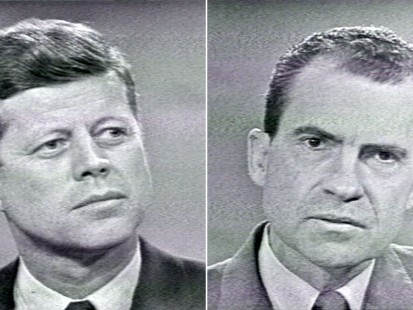 ABC News
ABC News ABC News’ Z. Byron Wolf and Huma Khan report:
Rick Perry’s big “oops” at the Republican presidential debate in Michigan Wednesday is not the first time a candidate has slipped up during a televised debate.
As much as they prepare in advance, many other candidates have fumbled and stumbled while in the spotlight.
The first debate gaffe came during the first debate, between John F. Kennedy and Richard Nixon. From Nixon’s swat to Arizona Gov. Jan Brewer’s brain freeze, here is a look at some of the more notable debate bloopers in U.S. politics.
Perry’s ‘Oops’
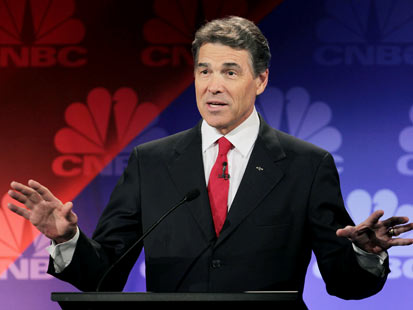 When Rick Perry forgot one of three federal agencies he’d do away with and flailed about, he didn’t sputter about on a primary debate stage in Michigan, he imploded.
When Rick Perry forgot one of three federal agencies he’d do away with and flailed about, he didn’t sputter about on a primary debate stage in Michigan, he imploded.
As ABC News’ Michael Falcone points out, “It wasn’t just a fumble or a stumble, it was an all out face plant. The third agency Perry couldn’t think of was the Department of Energy, which he rails against on the stump nearly every day. ”
“Seriously?” CNBC moderator John Harwood pressed Perry during the debate. “But you can’t name the third one?”
“The third agency of government I would do away with - the education, the uh, the commerce and let’s see,” Perry said. “I can’t — the third one. I can’t. Sorry. Oops.”
Nixon’s Sweat
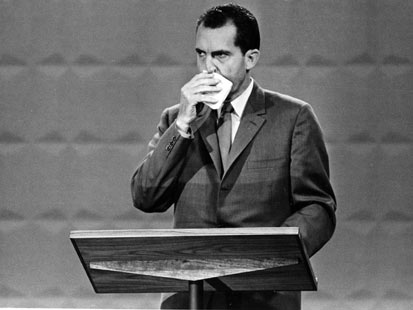
AP Photo
Gaffes go all the way back to the first televised debate, in 1960, between Sen. John F. Kennedy and Vice President Richard Nixon.
The problem for Nixon was less in what he said than how he appeared: sweaty. He appeared to be dripping with sweat on the debate. He had just spent 12 days in the hospital for a knee operation and a staph infection. He had also lost weight in the hospital and his clothes were ill fitting.
That debate was a watershed moment in U.S. politics. For the first time, two candidates squared off on live television. More than 77 million people – two thirds of the adult population at the time – tuned in.
Read more about the Kennedy-Nixon debates of 1960.
Gerald Ford and Soviet Domination

Dirck Halstead/Liaison/Getty Images
Rick Perry’s problem was not being able to remember an important plank of his platform. Gerald Ford’s problem in a 1976 debate with Jimmy Carter was being absolutely wrong. Ford said he would not allow Communism to spread.
“There is no Soviet domination of Eastern Europe and there never will be under a Ford administration,” he said.
Moderator Max Frankel looked befuddled by Ford’s statement, which seemed to defy commonly held U.S. beliefs about life behind the Iron Curtain, and asked him to clarify it.
“I don’t believe, uh – Mr. Frankel that uh – the Yugoslavians consider themselves dominated by the Soviet Union,” Ford said. “I don’t believe that the Romanians consider themselves dominated by the Soviet Union. I don’t believe that the Poles consider themselves dominated by the Soviet Union. Each of those countries is independent, autonomous: it has its own territorial integrity and the United States does not concede that those countries are under the domination of the Soviet Union. As a matter of fact, I visited Poland, Yugoslavia and Romania to make certain that the people of those countries understood that the president of the United States and the people of the United are dedicated to their independence, their autonomy and their freedom.”
The moment became a major theme of the 1976 presidential election.
Watch Ford’s “Soviet domination” moment here.
“Why am I here?” – Adm. James Stockdale

Ann States/Consolidated News Pictures/Getty Images
Admiral James Stockdale, who had been a Vietnam prisoner of war, was new to politics when businessman Ross Perot selected him as his running mate for an independent presidential bid in 1992.
Stockdale’s opportunity to introduce himself to the country was at a vice presidential debate with then-Sen. Al Gore and Vice President Dan Quayle. When it came to be Stockdale’s turn to give an opening statement, he joked, “Who am I? Why am I here?” The audience laughed. But the strange use of a rhetorical question became known as the “Stockdale Moment.”
George H.W. Bush’s Impatience

Greg Gibson/AP Photo
The nation’s 41st president was caught in a crossfire when running for a second term. Faced with a weak economy and a personable challenger in the face of Bill Clinton, Bush had a tough time holding his ground.
That was made worse in the second presidential debate with Bill Clinton and Ross Perot in 1992. When asked by an audience member how the recession had personally affected him, Bush tucked his suit, checked his watch and gave a lengthy answer that failed to answer the question directly.
Bush’s move was widely panned as a sign of boredom and impatience with a question that weighed heavily on Americans’ minds. Already criticized for his lack of action on the economy, the hoopla surrounding that moment did not serve his candidacy well.
Bush lost to Clinton.
Al Gore’s Sigh
It was called the sigh heard round the world.
In 2000, Vice President Al Gore fought to soften his image as a buttoned up politician. He famously wore sweaters at campaign events.
But one lasting impression came from his reaction to George Bush at debates. Gore sighed loudly and repeatedly in frustration as then-Texas Gov. George W. Bush would make points. The sighs made Gore appear condescending. The sighs were the butt of jokes, like on “ The Daily Show” and “Saturday Night Live.”
Aides made gore watch the “Saturday Night Live” parody before the next debate.
Jan Brewer’s Brain Freeze
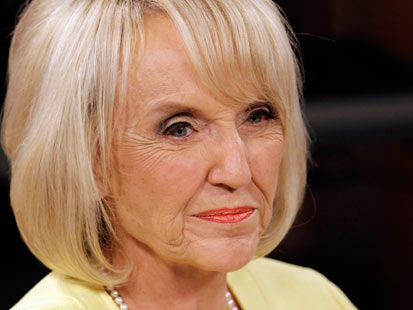
Matt York/AP Photo
The Arizona governor might have a way with words when it comes to criticizing President Obama, but she was left speechless under the spotlight. As she delivered her opening remarks in a September 2010 debate, Brewer suddenly went silent.
“We Republicans have done everything that we can possibly do,” Brewer read from her prepared remarks, and then appeared to struggle with what came next. She instead delivered an awkward laugh.
Brewer appeared to have another brain lapse after the debate. Surrounded by reporters, who questioned why she didn’t answer the question about “beheadings” and illegal immigrants, Brewer stood silent. Cue awkward pause.
Brewer left the room without answering the question.
Brewer later said she may have suffered from a “brain freeze” during the debate. Despite the multiple gaffes, she won a second term.
Michael Dukakis on death penalty
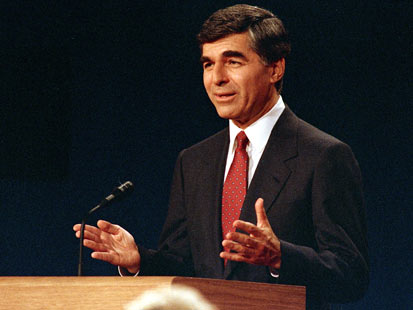
Lennox McLendon/AP Photo
Massachusetts Gov. Michael Dukakis’ famous answer to a death penalty question in 1988 might have cost him the presidential race.
Pitted against George H.W. Bush, the Democratic candidate was asked if he would favor an irrevocable death penalty for the killer if his wife, Kitty, was raped and murdered.
“No, I don’t, and I think you know that I’ve opposed the death penalty during all of my life,” Dukakis said.
His response was immediately assailed as cold and detached, though the questioner, CNN’s Bernard Shaw, was also criticized for asking such a charged question.
Dukakis’ standing in the polls plunged after the debate, and most politicos agree that the answer cost him the presidency.
Obama: “You’re Likable Enough Hillary”
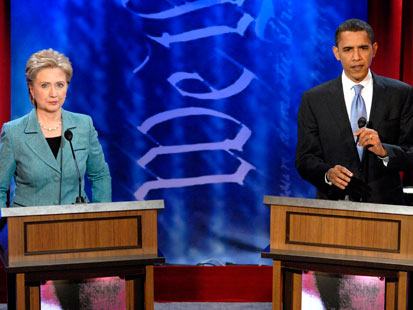
Mike Mergen/Bloomberg/Getty Images
As if the tension between candidates Hillary Clinton and Barack Obama weren’t enough, the two shared an awkward moment during a 2008 debate when facing a question about Clinton’s likability.
Clinton was asked what she would say to voters of New Hampshire, who liked her resume but seemed to think Obama was more likable.
“Well, that hurts my feelings,” a seemingly embarrassed Clinton responded to laughter. “But I’ll try to go on.
“He’s very likable,” Clinton continued. “I agree with that. I don’t think I’m that bad.”
As Clinton fumbled, Obama looked up from his paper and interjected, “You’re likable enough, Hillary,” then promptly continued to write away.
“I appreciate that,” a laughing Clinton responded.
Obama defeated Clinton to become the U.S. president.
Bentsen to Quayle: “You’re no Jack Kennedy”

Barry Thumma/AP Photo
Democratic vice presidential candidate Lloyd Bentsen didn’t make it to the White House but he famously coined a term that continues to live in Washington’s vocabulary today.
At the 1988 vice presidential debate, then Sen. Bentsen and his opponent, Dan Quayle, were asked what plan they had in mind if they were to become president.
“I have far more experience than many others that sought the office of vice president of this country,” Quayle responded. “I have as much experience in the Congress as Jack Kennedy did when he sought the presidency.”
Quayle often compared himself to Kennedy. But this time, Bentsen didn’t let him get away with the comparison.
“Senator, I served with Jack Kennedy, I knew Jack Kennedy, Jack Kennedy was a friend of mine. Senator, you’re no Jack Kennedy.”
Bentsen’s quip received a loud applause.
Edwards to Cheney: You Have a Gay Daughter
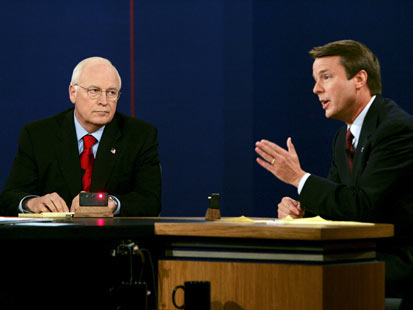
David Hume Kennerly/Getty Images
It was the battle of the veeps that put fiery Dick Cheney against young, personable John Edwards.
The 2004 debate between the two was full of drama. But the pinnacle came when the two were questioned about gay marriage.
Cheney, who has a lesbian daughter, said he didn’t agree with the Bush administration’s plans to impose a ban on gay marriage but said he would stand by his president on the issue. He didn’t mention his daughter, and he avoided mentioning her during most of the campaign.
Edwards, however, did not hold back.
“I think the vice president and his wife love their daughter. I think they love her very much. And you can’t have anything but respect for the fact that they’re willing to talk about the fact that they have a gay daughter, the fact that they embrace her. It’s a wonderful thing. And there are millions of parents like that who love their children, who want their children to be happy,” Edwards responded.
Cheney later wrote that he was angry and furious at Edwards and presidential John Kerry for raising the issue of his daughter’s sexuality.
Patricia Madrid’s Awkward Pause
It wasn’t at the scope of a presidential debate, but former New Mexico Lt. Gov. Patricia Madrid’s debate gaffe is undoubtedly one of the most awkward.
While running for the U.S. House of Representatives, Madrid was asked if she could point to something in her public service career that would reassure voters that she would prevent a tax increase.
Madrid appeared to lack a response. After a long, awkward pause, Madrid said, “Your president, you,” before going into another pause.
Watch the awkward moment here.
Madrid’s opponent, Heather Wilson, even made it part of her ad and went on to win the race.